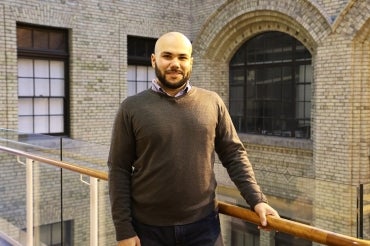U of T works in partnership with Mexico on PhD scholarship

Published: January 12, 2018
A Mexican-Canadian scholarship brought Rafael Escamilla to the University of Toronto, where the PhD student is now developing a biofeedback system to help people with prosthetic limbs achieve better control of their balance and gait.
He says he applied to U of T because Toronto seemed like a good place to raise a family and a chance to study at the university was a hard-to-miss opportunity.
“In Toronto, you feel part of the culture, part of the community. You don’t feel like a tourist,” he said. “U of T is one of the most prestigious universities in the world, and the program that it offers is very interesting.”
His research could eventually improve the lives of people with prosthetics around the globe, including in Mexico and Canada: “The fact that you can do something to contribute to society is a very rewarding experience,” Escamilla said.
Under a new agreement with Mexico, more Mexican students like Escamilla who want to study abroad will be coming to U of T. Mexico is investing in 150 new PhD students to come to U of T in a joint collaboration between the National Council of Science and Technology (CONACyT) in Mexico and the university. Building on past CONACyT initiatives and a shared long-term vision, the new agreement hopes to encourage a greater flow of talent and ideas between both countries.
In addition, officials from Mexico’s Ministry of Energy and U of T are working on finalizing another initiative that is designed to bring another 150 graduate students and post-doctoral researchers to the university – recruits who would solely focus on clean energy research.
Ted Sargent, U of T’s vice-president international, said that the new agreement seeks to boost the number of PhDs from Mexico, which currently sits at 30. He visited Mexico last year to meet with prospective students, parents, alumni, friends and partners.
"We want to make this something much bigger,” Sargent said. “We want to attract more students from Mexico.
“The university is committed to strengthening our global engagement by also supporting greater regional co-operation between U of T and North America. Opportunities like this allow us to train a new generation of leaders with strong global fluency and the capacity to contribute innovations that will drive our collective prosperity.”
For Mexico, it’s an effort to build national capacity and also talent in areas such as the energy sector and sustainability research through training opportunities in Canada.
“The scholarship program would serve as well to improve our understanding of each other and to develop our potential as an economic region, through academic collaboration and common research,” said Mexican Consul General Muñoz Ledo.
One of the many reasons the Mexican government is keen to provide the PhD scholarships is that it set national goals to reduce greenhouse gas emissions by 30 per cent by 2030 and increase electricity generated from clean energy sources to 35 per cent by 2024. The country is also leading a global innovation challenge on clean energy materials that comes out of the 2015 Paris climate conference (COP21), with researchers from the U.S., Canada and the European Union also participating.
“There’s a need and a big opportunity for Mexico to catch up on clean energy research and clean energy technology development,” said Hermann Tribukait, ambassador to North America for Mexico’s Energy Innovation Funds, managed by the Mexican Ministry of Energy. “For that, we need to build up our human capital and build capacity. We are developing this collaboration agreement with the best research universities in the world such as U of T.”
As for Escamilla, he is part of U of T's Institute of Biomaterials and Biomedical Engineering. For his graduate research, he is working with Assistant Professor Jan Andrysek’s PROPEL Lab at Holland Bloorview Kids Rehabilitation Hospital.
“What U of T gains from an agreement like this is students who want to come here,” Escamilla said. “Most of us are dedicated and passionate about our work, which is reflected in the number of times we are published and the number of conference that we attend. In Mexico, when we go back, we can apply all this knowledge to contribute to improve the quality of life for people living there. Our research can help people here as well as people back home.”


